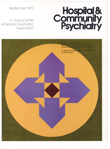Community Mental Health: A Noble Failure?
Abstract
Two studies were made in the northwestern region of Illinois to determine if the community approach helped restore the social competence and reduce the build-up of chronically ill patients. In the first study there was no indication that community care was superior to that of a traditional state hospital. Seventy-four per cent of the patients in the sample, however, had a history of repeated hospitalizations. The second study evaluated only first-admission patients andfound that community-oriented programs were more effective. Both the center and the hospital had some patients for whom neither system of care was more effective in preventing chronicity. The center has established several pilot projects for managing those chronic patients.
Access content
To read the fulltext, please use one of the options below to sign in or purchase access.- Personal login
- Institutional Login
- Sign in via OpenAthens
- Register for access
-
Please login/register if you wish to pair your device and check access availability.
Not a subscriber?
PsychiatryOnline subscription options offer access to the DSM-5 library, books, journals, CME, and patient resources. This all-in-one virtual library provides psychiatrists and mental health professionals with key resources for diagnosis, treatment, research, and professional development.
Need more help? PsychiatryOnline Customer Service may be reached by emailing [email protected] or by calling 800-368-5777 (in the U.S.) or 703-907-7322 (outside the U.S.).



